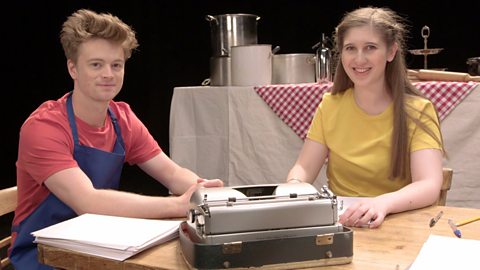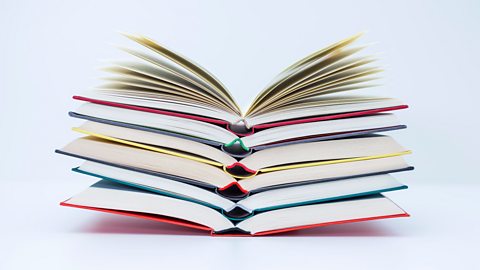Did you know?
The word essay comes from the French word ‘essayer’ meaning ‘to try’ or ‘to attempt’. A French writer called Michel de Montaigne invented the essay in Europe as his ‘attempt’ to write about himself and his thoughts.
Introduction to how to write an essay
An essay is a piece of non-fiction writing with a clear structure: an introduction, paragraphs with evidence and a conclusion. Writing an essay is an important skill in English and allows you to show your knowledge and understanding of the texts you read and study.
It is important to plan your essay before you start writing so that you write clearly and thoughtfully about the essay topic. Evidence, in the form of quotations and examples, is the foundation of an effective essay and provides proof for your points.
Video about planning an essay
Learn how to plan, structure and use evidence in your essays
Why do we write essays?
The purpose of an essay is to show your understanding, views or opinions in response to an essay question, and to persuade the reader that what you are writing makes sense and can be backed up with evidence. In a literature essay, this usually means looking closely at a text (for example, a novel, poem or play) and responding to it with your ideas.
Essays can focus on a particular section of a text, for example, a particular chapter or scene, or ask a big picture question to make you think deeply about a character, idea or theme throughout the whole text.
Often essays are questions, for example, ‘How does the character Jonas change in the novel, The Giver by Lois Lowry?’ or they can be written using command words to tell you what to do, for example ‘Examine how the character Jonas changes in the novel, The Giver by Lois Lowry.’
It is important to look carefully at the essay question or title so that you keep your essay focused and relevant. If the essay tells you to compare two specific poems, you shouldn’t just talk about the two poems separately and you shouldn’t bring in lots of other poems.

Which of these statements is false?
a) An essay is a piece of writing in response to an essay question or statement.
b) An essay in literature usually involves writing about a text (such as a novel, poem or play).
c) An essay allows you to write everything you know about everything that happens in a text.
Answer: c) This statement is incorrect. The essay question will tell you the topic to focus on.
Planning an essay
It is important to plan before you start writing an essay.
The essay question or title should provide a clear focus for your plan. Exploring this will help you make decisions about what points are relevant to the essay.
What are you being asked to consider?
Organise your thoughts. Researching, mind mapping and making notes will help sort and prioritise your ideas. If you are writing a literature essay, planning will help you decide which parts of the text to focus on and what points to make.
There are three main parts to an essay:
Introduction
- An introduction should focus directly on the essay question or title and aim to present your main idea in your answer. It briefly introduces your main ideas and arguments.
For more information, see our guide on how to write an introduction to an essay.
Main body, divided into paragraphs
- This is where you take your ideas and explore them in detail in separate paragraphs. You might want to start each paragraph with a topic sentence that summarises the main idea of the paragraph before bringing in your evidence and examples. A topic sentence acts like a mini introduction to the paragraph.
Conclusion
- A conclusion is the final paragraph of your essay. It should tie all the loose ends of your argument together.
For more information about conclusions, see our guide on how to write a conclusion to an essay.

Which of these is correct?
a) An essay consists of an introduction and conclusion only.
b) An essay has three parts: introduction, main body and conclusion.
c) An essay is three paragraphs long.
Answer: b) An essay has three parts: introduction, main body and conclusion.
Answering the question
When writing an essay it is important to answer the question and not just write everything you know about a particular subject. Part of the secret to writing a good essay is to carefully choose what is interesting and relevant.
To make sure you answer the question, the first step is to be clear: what does the essay want you to write about? In other words, what are the key words or phrases in the essay question or title?
The second step in answering the question is then to think about everything you do know about the topic and decide which ideas are the strongest and most interesting to write about.
If the essay asks you about one of the characters that must be your focus. For example, if you are asked to write about a character, like Jonas in The Giver, then it is not a good idea to spend paragraphs describing other characters – however important they might be to the story.

Which is correct?
Which of these sentences clearly answers the essay question: Why is the importance of memory a key theme in The Giver?
a) In The Giver, Jonas’s community is obsessed with precision of language.
b) In The Giver, Lowry shows that without memory, it is difficult for people to understand their own history and make choices about their future.
c) Memory is a really important part of making a person who they are and many novels focus on memories including A Christmas Carol by Charles Dickens.
Answer: b) This is the only sentence that writes about both memory and the novel, The Giver.
Using evidence
Evidence is the foundation of an effective essay and provides proof for your points.
For an essay about a piece of literature, the best evidence will come from the text itself.
Back up each of your supporting statements with evidence. The evidence should be relevant and clearly connected to the point you’re making.
In a literary essay, evidence could take the form of:
- Quotations from the text, for example, if the essay focus was on the character of The Giver, it would be useful to explain that Lowry first describes The Giver as ‘tired’ ‘old’ and ‘weighted’ which suggests that he is suffering.
- Examples that describe the text. For example, for the same essay focusing on the character of The Giver, it might be interesting to explore the way that The Giver chooses the memories for Jonas to experience or his sadness at the loss of Rosemary. You can't quote all of this so you have to summarise the text.

True or false?
Evidence only includes quotations from the text.
Answer: False. Evidence includes referring to what happens in the text as well – it doesn’t always have to be in the form of a quotation.
Referring to literary devices
In literature essays, you are often asked to look closely at how the writer writes and analyse the language used. For example, what words and phrases does the writer use? Do they use any literary devices like metaphorMakes a direct comparison by presents one thing as if it were something else with the characteristic. For example describing a brave person as a lion. or simileA literary technique where a comparison is made between two things using ‘as’ or ‘like’. and what is the effect of them? Do they repeat words or create other patterns with language? It is worth looking carefully at quotations to notice what the writer is doing and why they might be doing it.
For example in The Giver, Jonas is given access to lots of memories – some wonderful, some painful. At one point, he receives a memory of a ‘bright, breezy day on a clear turquoise lake, and above him the white sail of the boat billowing as he moved along in the brisk wind.’ In an essay you could use this as an example of a positive memory that has been lost to everyone except Jonas and The Giver. You could then zoom in deeper on the quotation and comment on the language and its effect. You might notice the alliteration of the ‘b’ sound or the use of colour imagery to help to create such a positive memory.
In a literature essay it is useful to know how to use technical terms such as metaphor, simile or imagery. It is also useful to use technical vocabulary for writing about literature such as plot, character, setting or theme.
Explaining effects of language
In a literature essay it is not only important to be able to write about what happens or the big ideas of the text but also to look closely at the effect of the words and phrases from the text that you are using as evidence.
For example, in the novel, The Giver, it is clear that having access to years of memories is difficult. When Jonas ‘braced himself and entered the memory which was torturing The Giver’ it would be worth noting the use of the word ‘torture’ in an essay. So for example, you could write after using this quotation:
Lowry chooses the powerful word ‘torture’ to describe the memories and reveal to the reader that this is a painful process which creates terrible suffering.
Remember
Thinking about what to include in an essay first will make it easier to structure and write the essay. Your essay will be much more convincing if you can offer evidence for each of your ideas. A literature essay will also benefit from you knowing technical terms about literature and language and using them to explain and add depth to your ideas.
Test your knowledge
Secondary games. gameSecondary games
Have fun playing science, maths, history, geography and language games

More on Essay writing
Find out more by working through a topic
- count3 of 5

- count4 of 5

- count5 of 5

- count1 of 5
